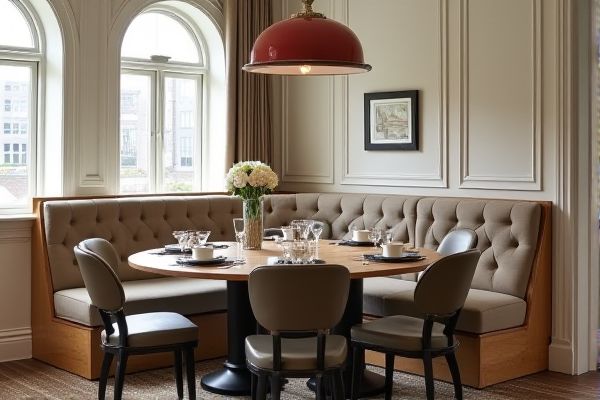
Banquette seating offers built-in upholstered benches often found in restaurants for a cozy, space-saving solution, while traditional bench seating tends to be standalone, versatile furniture pieces ideal for both indoor and outdoor use. Explore the rest of the article to discover which seating option best fits Your style and functionality needs.
Table of Comparison
| Feature | Banquette Seating | Bench Seating |
|---|---|---|
| Definition | Built-in upholstered seating, often against a wall | Long, backless seating, can be movable or fixed |
| Comfort | High comfort with back support and cushioning | Lower comfort; usually no back support or cushion |
| Space Efficiency | Maximizes wall space, ideal for small areas | Versatile for both small and large spaces |
| Design Flexibility | Fixed design, tailored to room aesthetics | Portable and easy to rearrange |
| Maintenance | Requires upholstery cleaning and care | Simple cleaning, usually less maintenance |
| Use Case | Restaurants, dining nooks, formal seating | Casual seating, outdoor areas, multi-use spaces |
Introduction to Banquette and Bench Seating
Banquette seating offers a built-in, upholstered solution typically integrated along walls in restaurants or dining areas, maximizing space and providing a cozy, communal atmosphere. Bench seating features a freestanding or movable design, often without back support, offering flexibility and ease of rearrangement for various seating configurations. You can enhance your space by selecting between banquette's structured comfort and bench's versatile functionality, depending on your layout and usage needs.
Key Differences Between Banquettes and Benches
Banquettes feature upholstered, padded seating often built into a wall or corner, maximizing space and offering a cozy, stylish dining experience. Benches are typically freestanding, simpler in design, and can be moved easily, providing versatile seating options for various settings. Choosing between the two depends on your space constraints and the aesthetic or functional needs of your dining area.
Design Aesthetics: Banquette vs Bench Seating
Banquette seating offers a sleek, upholstered design that enhances comfort and adds a sophisticated, cozy ambiance to dining areas, often featuring high backs and tufted details. Bench seating provides a minimalist, versatile aesthetic with clean lines and can be crafted from various materials like wood or metal, effortlessly fitting both casual and modern interiors. The choice between banquette and bench seating depends on desired visual impact, with banquettes emphasizing plush elegance and benches highlighting functional simplicity.
Comfort Levels: Which Seating Wins?
Banquette seating offers enhanced comfort through padded upholstery and back support, making it ideal for extended dining experiences. Bench seating, while space-efficient and versatile, often lacks cushioning and individual support, which can reduce comfort during prolonged use. Your choice will depend on whether you prioritize plush comfort or practical flexibility in your seating arrangement.
Space Efficiency: Banquette or Bench?
Banquette seating offers higher space efficiency by utilizing wall space and providing continuous seating, maximizing capacity in smaller dining areas. Bench seating, while flexible and movable, generally requires more floor space due to separate units, making it less ideal for compact layouts. For optimizing dining room space, banquette seating is the preferred choice in restaurants and cafes.
Installation and Customization Options
Banquette seating offers versatile installation options, easily fitting against walls to maximize space and often incorporating built-in storage, while bench seating can be freestanding or fixed and provides straightforward placement flexibility. Customization for banquettes includes tailored upholstery, shapes, and dimensions to suit specific room layouts, whereas benches offer options in materials, finishes, and cushion designs to match diverse decor styles. You can optimize your space with a banquette's integrated design or choose the simplicity and adaptability of bench seating based on your installation and customization preferences.
Maintenance and Durability Comparison
Banquette seating typically features upholstered surfaces that require regular cleaning and care to maintain their appearance, making them more susceptible to stains and wear over time. Bench seating, often made from solid wood or metal, offers higher durability with easier maintenance due to its simpler design and fewer fabric components. Choosing the right option for your space depends on balancing aesthetic preferences with the practical demands of upkeep and longevity.
Cost Analysis: Banquette vs Bench
Banquette seating typically incurs higher installation and customization costs due to built-in construction and upholstery requirements, while bench seating offers a more budget-friendly option with simpler designs and easier mobility. Maintenance expenses for banquettes may increase because of fixed structures and fabric upkeep, whereas benches allow for easier cleaning and replacement. Overall, businesses aiming to maximize space and comfort may invest more initially in banquettes, but benches provide cost-effective flexibility and lower long-term expenses.
Best Use Cases for Banquettes and Benches
Banquettes excel in maximizing space and adding a cozy, intimate vibe to dining areas, making them ideal for restaurants, cafes, and home breakfast nooks. Benches offer versatile seating solutions perfect for communal spaces, outdoor patios, and casual dining setups where flexibility and easy movement are essential. Choose banquettes for a tailored, built-in look that enhances decor, while benches fit your needs for adaptable, space-efficient seating.
Choosing the Right Seating for Your Space
Banquette seating maximizes space efficiency by providing continuous, built-in seating along walls, ideal for smaller rooms or areas needing a sleek, cohesive look. Bench seating offers flexibility with movable options, allowing you to reconfigure your space easily and accommodate varying group sizes. Your choice depends on the desired balance between fixed, space-saving design and adaptable, versatile seating arrangements.
 homyna.com
homyna.com